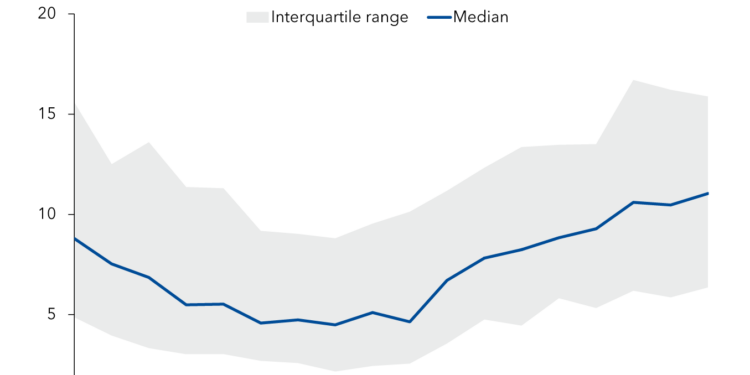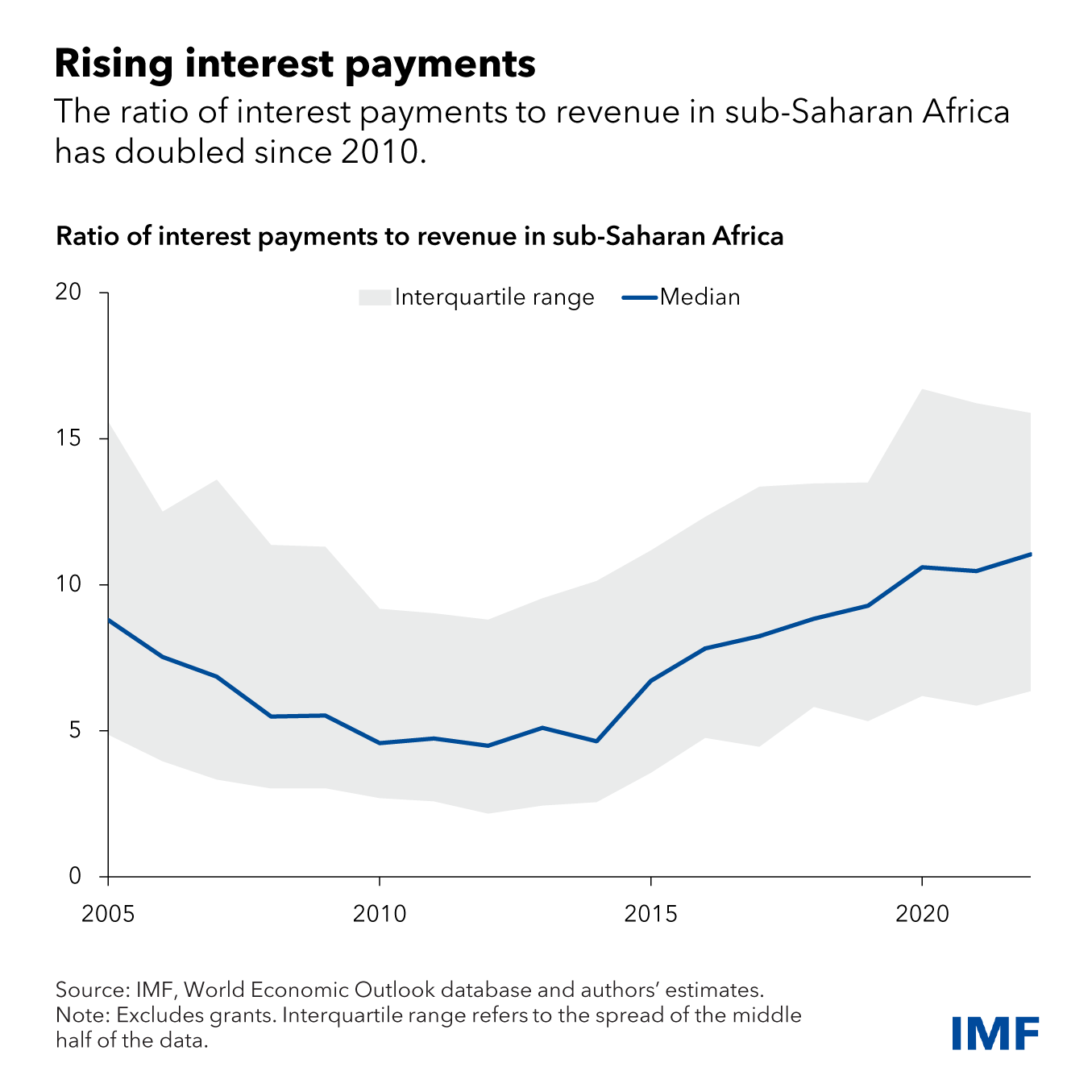How to avoid a debt crisis in sub-saharan Africa
Public debt in the region has risen to levels not seen in decades
The average debt ratio in sub-Saharan Africa has almost doubled in just a decade—from 30 percent of GDP at the end of 2013 to almost 60 percent of GDP by end-2022. Repaying this debt has also become much costlier.
The region’s ratio of interest payments to revenue, a key metric to assess debt servicing capacity and predict the risk of a fiscal crisis, has more than doubled since the early 2010s and is now close to four times the ratio in advanced economies. As of 2022, more than half of the low-income countries in sub-Saharan Africa were assessed by the IMF to be at high risk or already in debt distress.
These trends have sparked concerns of a looming debt crisis in the region. A recent IMF paper offers possible solutions to prevent this from happening. It identifies five policy actions African governments can take to preserve the sustainability of public finances, while also achieving the region’s development goals.
1. Set a course: re-anchor fiscal policy through a credible medium-term strategy
In most sub-Saharan African countries, fiscal policy focuses excessively on short-term goals and is not guided by a clear medium-term strategy. This lack of anchoring has resulted in frequent breaches of fiscal rules and ever-increasing public debt levels.
A more strategic approach to fiscal policy would be preferable by setting explicit debt targets that integrate key policy trade-offs between debt sustainability and development objectives, rather than focusing narrowly on short-term fiscal deficits. The paper suggests a novel approach to estimating country-specific medium-term debt anchors, which ensures that debt service costs remain manageable. According to this methodology, the median debt anchor for the region is about 55 percent of GDP; slightly more than half of the countries were above their anchor at end-2022.
2. Get ready: undertake fiscal adjustment to bring debt back to a safer level
IMF staff analysis shows that most countries in the region will need to reduce their fiscal deficits in the coming years. For the average country, the amount of adjustment is about 2 to 3 percent of GDP.
This adjustment seems feasible given historical experience—in the past, countries in sub-Saharan African countries improved their primary balance by 1 percent of GDP a year over two to three years.
But not all countries face the same challenge. About a quarter of the region’s economies still have some fiscal space and can use it to maintain and even increase vital investments in human and physical capital. On the other hand, a few countries have very large adjustment needs; for them, it is unlikely that fiscal consolidation alone will be enough to ensure fiscal sustainability. It may need to be complemented by debt reprofiling or restructuring.
3. Chip in: mobilize more domestic revenue
Sub-Saharan African countries tend to rely excessively on expenditure cuts to reduce their fiscal deficits. Although this may be warranted in some circumstances, revenue measures, like eliminating tax exemptions or digitalizing filing and payment systems, should play a greater role. Mobilizing domestic revenue is less detrimental to growth in countries where initial tax levels are low, whereas the cost associated with reducing expenditures is particularly high given Africa’s large development needs.
While difficult to achieve, large and rapid increases in revenue have been observed in some countries like The Gambia, Rwanda, Senegal, and Uganda, which relied on a mix of revenue administration and tax policy measures.
4. Shore up the house: strengthen budget institutions to improve the implementation of fiscal plans
Policy changes are more likely to yield tangible results if fiscal institutions are strong and efficient. On the expenditure side, well-designed plans too often yield disappointing results due to budgetary slippages or an unforeseen materialization of fiscal risks. Adopting a medium-term fiscal framework, putting in place tools to better assess and manage fiscal risks, and enhancing controls over government expenditure during the budget implementation phase are key to avoiding such pitfalls.
Strong expenditure controls—by strengthening the legal budgeting framework, improving fiscal reporting, and empowering audit and control institutions—are particularly important, as they help countries avoid budgetary slippages, as well as decrease the risk of extra-budgetary commitments, which are widespread in the region.
5. Get people on board: anticipate public resistance to reforms
The sustainability of a new fiscal strategy also depends on the government’s ability to secure public support by linking the policy measures to longer-term benefits. Public acceptance should be a central consideration in policy design—for instance, by sequencing reforms carefully and introducing compensatory measures.
Communication campaigns that transparently and credibly outline the long-term benefits of the reform, its distributional consequences, and the costs of inaction are also critical. Public acceptance of reforms depends more generally on the ability of governments to convince the population that they will use public funds in an efficient, fair, and transparent manner.










